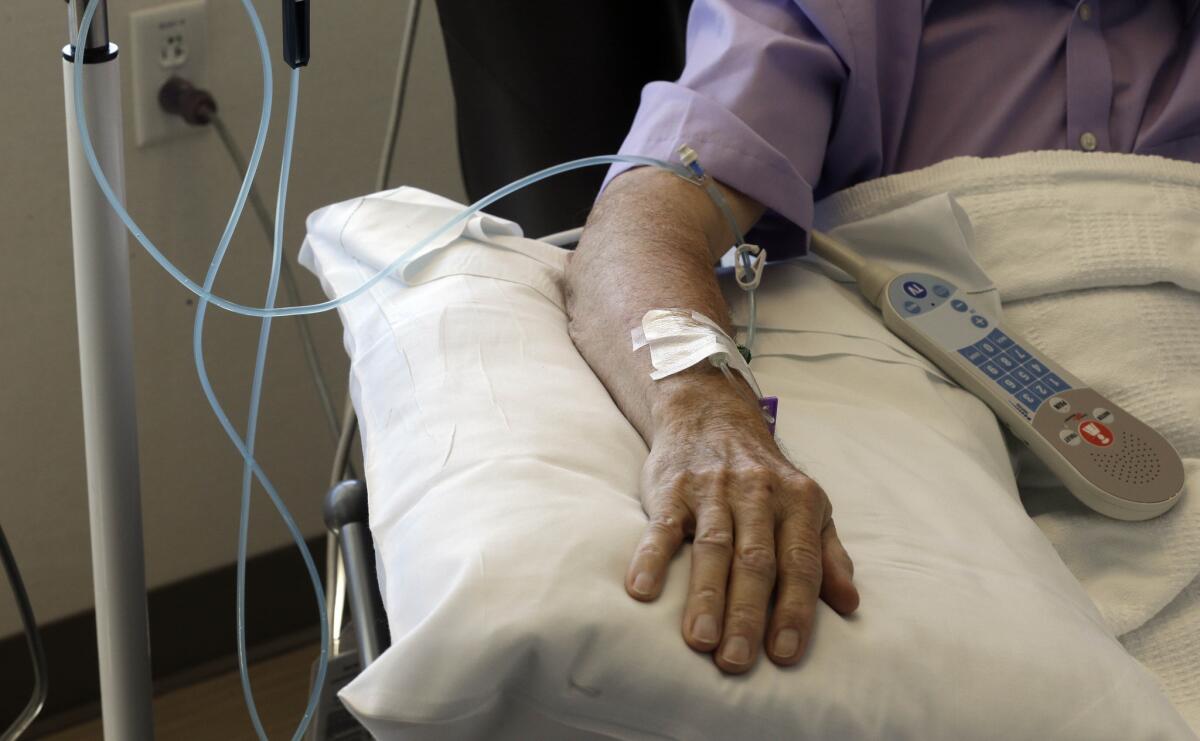As death nears, chemotherapy may do more harm than good

Treatment guidelines recommend only administering chemotherapy to terminal cancer patients with high “performance status” -- those who function fairly normally, despite their grave illness. But a new study found that such patients who receive chemotherapy have a lower quality of life in the last week of life than patients who don’t receive chemo.
- Share via
It’s been documented that many terminal cancer patients don’t benefit from chemotherapy and other types of treatments toward the end of their lives. Nonetheless, many, with their doctors, opt to continue treatment -- faced with impossible choices, they hold on to hope that treatment might buy some time, or improve the quality of the days they have left.
A new study, published Thursday in JAMA Oncology, may lead some to different decisions.
Corresponding author Holly G. Prigerson of the Center for Research on End-of-Life Care at Weill Cornell Medical College and coauthors explored whether chemotherapy improved quality of life for terminal patients during the final week of life.
The researchers followed 661 end-stage cancer patients, recruited between September 2002 and February 2008, whose doctors believed they had no more than six months to live. The researchers recorded patient demographic information, whether they were receiving chemotherapy, health status, and “baseline performance status” -- a standard measure of how active and self-sufficient patients were at the beginning of the study. They assess quality of life in patients’ last week of life by surveying their caregivers after the subjects died.
Most patients -- 384, or 58.1% -- died over the course of the study observation period. Risk of death was not significantly associated with chemotherapy use. Chemotherapy use also didn’t seem to impact quality of life in the final week for patients whose baseline performance status was moderate or poor. But among patients who started out with good performance status -- those with terminal cancer who were able to go about their daily activities more or less normally, and for whom chemotherapy has been thought to be helpful as a palliative measure -- chemotherapy had a significant negative impact on quality of life.
“Results of this study suggest that chemotherapy use among patients with chemotherapy-refractory metastatic cancer is of questionable benefit to patients’ quality of life in their final week,” they wrote. “Not only did chemotherapy not benefit patients regardless of performance status, it appeared most harmful to those patients with good performance status...guidelines regarding chemotherapy use in patients with terminal cancer may need to be revised.”
In an editorial accompanying the study, Dr. Charles D. Blanke and Dr. Erik K. Fromme of the Oregon Health & Science University in Portland wrote that the study, while not designed to measure whether chemotherapy prolongs survival in end-stage cancer patients, might serve as “the closest we are likely to come to obtaining proof of the real-world effectiveness” of the intervention, since a randomized controlled trial would be unlikely. They wrote that the results “stand as a relative indictment of routinely offering chemotherapy to patients with terminal cancers.”
“These data...suggest that equating treatment with hope is inappropriate,” they continued, calling on oncologists instead to discuss the pros and cons of continuing treatment with late-stage cancer patients. “Let us not contribute to the suffering that cancer, and often associated therapy, brings, particularly at the end.”
For more on science and health, follow me on Twitter: @LATerynbrown
NEWSLETTER: Get the day’s top headlines from Times Editor Davan Maharaj >>
ALSO:
To fend off dementia, run -- or dance, bike, power-walk or step
With millions more expected to develop Alzheimer’s, more research funding demanded
Genetics study points toward eyedrop treatment for cataracts






